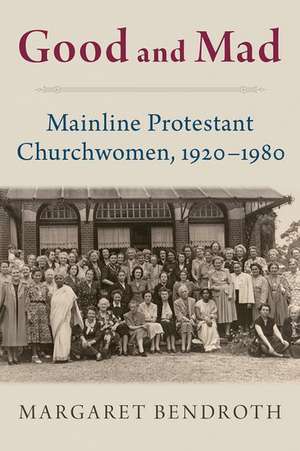Good and Mad: Mainline Protestant Churchwomen, 1920-1980
Autor Margaret Bendrothen Limba Engleză Hardback – 12 ian 2023
Preț: 491.93 lei
Preț vechi: 544.69 lei
-10% Nou
Puncte Express: 738
Preț estimativ în valută:
94.13€ • 98.29$ • 77.73£
94.13€ • 98.29$ • 77.73£
Carte disponibilă
Livrare economică 14-20 martie
Preluare comenzi: 021 569.72.76
Specificații
ISBN-13: 9780197654064
ISBN-10: 0197654061
Pagini: 264
Dimensiuni: 237 x 163 x 24 mm
Greutate: 0.5 kg
Editura: Oxford University Press
Colecția OUP USA
Locul publicării:New York, United States
ISBN-10: 0197654061
Pagini: 264
Dimensiuni: 237 x 163 x 24 mm
Greutate: 0.5 kg
Editura: Oxford University Press
Colecția OUP USA
Locul publicării:New York, United States
Recenzii
This book uncovers the wounds hidden inside the placid 'church ladies' of mid-twentieth-century mainline Protestantism. Beautifully written and meticulously researched, it reveals the now-forgotten world of women striving for equality within institutions that took them for granted yet couldn't survive without them. Both a daring and mature work of scholarship, Good and Mad is Margaret Bendroth at her best.
Recovering the stories of churchwomen who were noted, if at all, as 'Mrs. Husband's Name' might seem tedious and unrewarding, but this book is quite the opposite—energetic, colorful, enlightening, and propelled by an undercurrent of justified rage. Bendroth's canny institution-shapers were conspicuously well-behaved, yet they did make history.
Good and Mad reveals the centrality of gender to the rise and fall of the Protestant mainstream. With her incomparable knowledge of relevant sources, Bendroth introduces a cast of little-known characters, conferences, and documents that paint an entirely new picture of debates over women in the churches. The result is the most important re-interpretation of 20th-century U.S. Protestantism to appear in years.
Mainline Protestantism was a distinctive cultural and institutional setting for twentieth-century American women to confront patriarchy and to question their own instincts about gender and faith. Bendroth's characters were often 'mad' at patriarchy, but in keeping with their churchly milieu they were determined to be 'good,' which made them slow to recognize their own anger and how to act on it. Good and Mad is a fresh and probing analysis of a substantial piece of American religious and women's history.
It is a fascinating — if sometimes exasperating — read.
The decades from 1920 to 1980 are painful ones to examine, but in Bendroth's hands they are revealed as more interracial, ecumenical, tolerant, international in scope, and enduring-largely because of women's ways of leadership.
Recommended. Upper-division undergraduates through faculty; professionals.
Good and Mad succeeds in filling a gap in the existing literature on Protestant women between the Social Gospel and the final push for women's ordination.
Recovering the stories of churchwomen who were noted, if at all, as 'Mrs. Husband's Name' might seem tedious and unrewarding, but this book is quite the opposite—energetic, colorful, enlightening, and propelled by an undercurrent of justified rage. Bendroth's canny institution-shapers were conspicuously well-behaved, yet they did make history.
Good and Mad reveals the centrality of gender to the rise and fall of the Protestant mainstream. With her incomparable knowledge of relevant sources, Bendroth introduces a cast of little-known characters, conferences, and documents that paint an entirely new picture of debates over women in the churches. The result is the most important re-interpretation of 20th-century U.S. Protestantism to appear in years.
Mainline Protestantism was a distinctive cultural and institutional setting for twentieth-century American women to confront patriarchy and to question their own instincts about gender and faith. Bendroth's characters were often 'mad' at patriarchy, but in keeping with their churchly milieu they were determined to be 'good,' which made them slow to recognize their own anger and how to act on it. Good and Mad is a fresh and probing analysis of a substantial piece of American religious and women's history.
It is a fascinating — if sometimes exasperating — read.
The decades from 1920 to 1980 are painful ones to examine, but in Bendroth's hands they are revealed as more interracial, ecumenical, tolerant, international in scope, and enduring-largely because of women's ways of leadership.
Recommended. Upper-division undergraduates through faculty; professionals.
Good and Mad succeeds in filling a gap in the existing literature on Protestant women between the Social Gospel and the final push for women's ordination.
Notă biografică
Margaret Bendroth is a historian who served over 15 years as Executive Director of the Congregational Library and Archives. She received her Ph.D. in American history from Johns Hopkins University and worked as a Professor of History at Calvin College from 1998 to 2004. Over the course of her career, she has been president of the American Society of Church History (2015) and authored and edited eight books and numerous articles on modern American religion, including The Last Puritans: Mainline Protestants and the Power of the Past (2015), Fundamentalists and the City: Conflict and Division in Boston's Churches, 1885-1950 (2005), and Fundamentalism and Gender, 1875 to the Present (1993).
